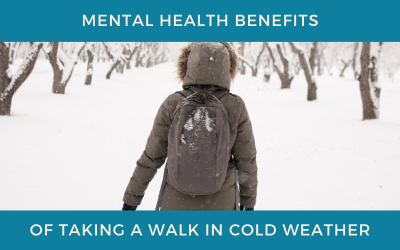The onset of winter often lures us into the cozy sanctuaries of our homes, wrapped in blankets and sipping warm beverages. It’s a natural inclination to seek refuge from the cold, but in doing so, we may be missing out on the profound mental health benefits that a wintry outdoor stroll can offer. In this article, we will delve into the numerous advantages of venturing outside into the crisp, chilly air during the winter months, exploring how this seemingly counterintuitive act can significantly contribute to your overall well-being.
 Mood Enhancement
Mood Enhancement
One of the immediate mental health benefits of walking in cold weather is an uplift in mood. Exposure to the cold triggers the release of endorphins, often referred to as “feel-good” hormones. These endorphins can help reduce symptoms of depression and anxiety and enhance your overall sense of well-being. The refreshing cold air can serve as a natural mood booster.
Stress Reduction
Walking in a cold environment can be a form of mindfulness. The sharp contrast between the warmth of indoor spaces and the cold outside can help you focus on the present moment. This contrast has a grounding effect, allowing you to let go of stress and worries, at least temporarily. As you concentrate on your surroundings, you can experience a reduction in stress and tension.
Increased Alertness and Concentration
Cold weather can have a rejuvenating effect on your mental clarity and focus. The shock of the cold can increase your alertness and stimulate cognitive functions. As a result, taking a walk in the cold can help you feel more awake and attentive, which is especially useful if you’re experiencing mental fog or fatigue.
Seasonal Affective Disorder (SAD) Management
Many people experience Seasonal Affective Disorder (SAD), a type of depression that occurs during the winter months. Taking walks in the cold can be an effective way to manage the symptoms of SAD. The exposure to natural light, even during overcast days, can help regulate your body’s internal clock and improve your mood.
Increased Resilience
Braving the cold can build mental resilience. When you overcome the initial discomfort and step outside for a walk, it can provide a sense of accomplishment. This achievement can boost your self-esteem and reinforce your ability to overcome challenges, which is essential for good mental health.
 Social Connection
Social Connection
Taking walks in the cold can also be a social activity. Sharing a winter walk with a friend or family member allows you to connect, communicate, and support each other emotionally. Social interaction is a crucial component of good mental health.
Improved Sleep
Regular exposure to cold weather can improve your sleep patterns. The drop in temperature after a cold walk can make it easier for your body to cool down, which is conducive to better sleep. Quality sleep is essential for mental health, as it rejuvenates both your body and mind.
While the temptation to stay indoors during cold weather is understandable, the mental health benefits of taking a walk outside in the cold are too significant to ignore. From mood enhancement to stress reduction, increased alertness, and improved resilience, the brisk winter air can provide a much-needed mental health boost. So, the next time you’re feeling down or stressed during the winter season, bundle up and step outside for a refreshing walk to experience these mental health benefits firsthand.


 Social Connection
Social Connection